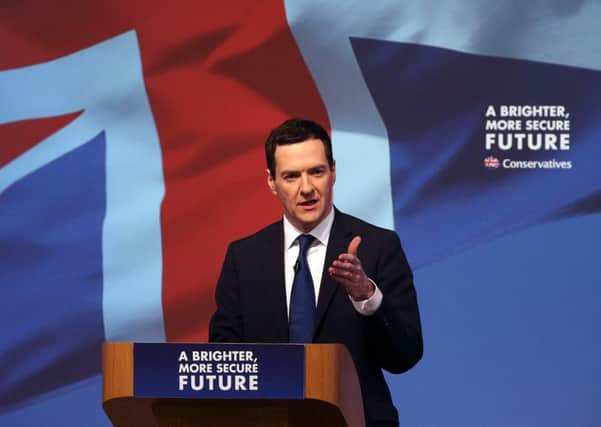Osborne’s privatisation plans dwarf past 20 years


Analysis of the Chancellor’s plans for this year reveals that the selling of stakes in Royal Mail, RBS and other organisations is likely to generate around £31.8bn in 2015-16.
This is more than the total of £31.7bn raised by all privatisations since 1993, according to calculations based on a document outlining financial details of past sell-offs compiled by the House of Commons library.
Advertisement
Hide AdAdvertisement
Hide AdComparing Mr Osborne’s plans for this year with past privatisations also shows that 2015-16 will see the largest amount of money raised through the disposal of public assets in any 12-month period in modern history.
While the Chancellor’s plans were defended by the UK government and praised by right-wing think tanks, last night there was criticism of his approach from the SNP, Labour and trade union leaders.
The SNP’s economy spokesman Stewart Hosie accused the Chancellor of putting “his friends” in the City before the taxpayer.
Mr Hosie said: “We know the sale of Royal Mail was botched. It should never have been privatised, but worse still the UK government sold off a valuable public asset at well below its true value.
“And with the sell-off of RBS, the taxpayer should not and cannot be short-changed by the Chancellor.
“We cannot have the Chancellor rewarding his friends in the City over the taxpayer.”
Unite general secretary Len McCluskey described the findings as “the sale of the century” and also said Mr Osborne was “rewarding the Tory party’s friends in the City in a spectacularly lavish style”.
He said: “These are public assets belonging to the taxpayer, held in trust for the future for the benefit of the many, not for the financial gain of a rich City elite.
Advertisement
Hide AdAdvertisement
Hide Ad“George Osborne is being utterly irresponsible and inconsistent. On the one hand he announces £12bn of cuts, the pain of which will be felt by the most vulnerable, on the other he rushes through the RBS sale and in the process loses out on a £14bn return to taxpayers.
“This is money that could have been spent on infrastructure investment, education and health for the benefit of all.”
The criticisms of Chris Leslie MP, Labour’s shadow chancellor, were particularly focussed on the sale of the taxpayer-owned RBS.
“George Osborne’s rush to begin the sell-off of RBS has meant a loss to the taxpayer of as much as £1bn,” Mr Leslie said.
“Taxpayers who bailed out RBS and who have now lost out will want to know why the government has sold these shares at a discount and while the bank is still awaiting a US settlement for the mis-selling of subprime mortgages.
“Getting back the taxpayers’ money is not an impossible objective and the Chancellor is dismissing this too lightly.”
Mr Osborne began his programme of sell-offs this week when he authorised the disposal of £2.1bn of shares in RBS.
Further sales are planned for the next few months, including the government’s remaining 30 per cent stake in Royal Mail, estimated to raise £1.5bn, and shares in Lloyds totalling around £12.9bn. The privatisation of £2.3bn of student loans, along with assets from the former bank Northern Rock and other sales, would bring the total for 2015-16 to £31.8bn.
Advertisement
Hide AdAdvertisement
Hide AdYesterday’s analysis also revealed that the figure of £31.8bn for 2015-16 is roughly one fifth of the total amount raised by all privatisations from 1979 to 2014 (£151bn).
The calculations were done using a House of Commons briefing paper, which gave details of previous privatisation programmes and the value of their sell-offs. The figures were then updated to todays prices using the Retail Price Index.
The previous 12-month record was set in 1991, when proceeds from the sale of government stakes in BT, National Power, PowerGen and regional electricity companies in Scotland raised £22.5bn.
The sale of the government’s remaining shares in Lloyds, estimated to bring in £12.9bn this year, would be the single biggest privatisation since the sale of British Gas in 1986, which raised £20.3bn.
Nigel Lawson is the chancellor who raised the most money through privatisations, selling off around £73bn of public assets between 1983 and 1989. Other chancellors to have presided over a large number of sell-offs include Norman Lamont (around £24bn) and Ken Clarke (£23bn).
During the Labour governments of 1997-2010, only £6.4bn of public assets were sold, including National Air Traffic Services in 2001 and British Nuclear Fuels Limited from 2006-9.
The Chancellor’s privatisation programme met with the approval of the Adam Smith Institute.
Last night a HM Treasury spokesman defended the Chancellor’s actions. The spokesman said: “As the Chancellor has said, if we want a more productive economy, then we should get the government out of the business of owning great chunks of our banking system – and indeed other assets that should be in the private sector.
Advertisement
Hide AdAdvertisement
Hide Ad“That is why the government is merging UK Financial Investments and the Shareholder Executive into one organisation, to return government investments back to the private sector.
“And it’s why we are determined to deliver the biggest ever sale of publicly-owned corporate and financial assets in 2015-16, exceeding £30bn in real terms for the first time.”